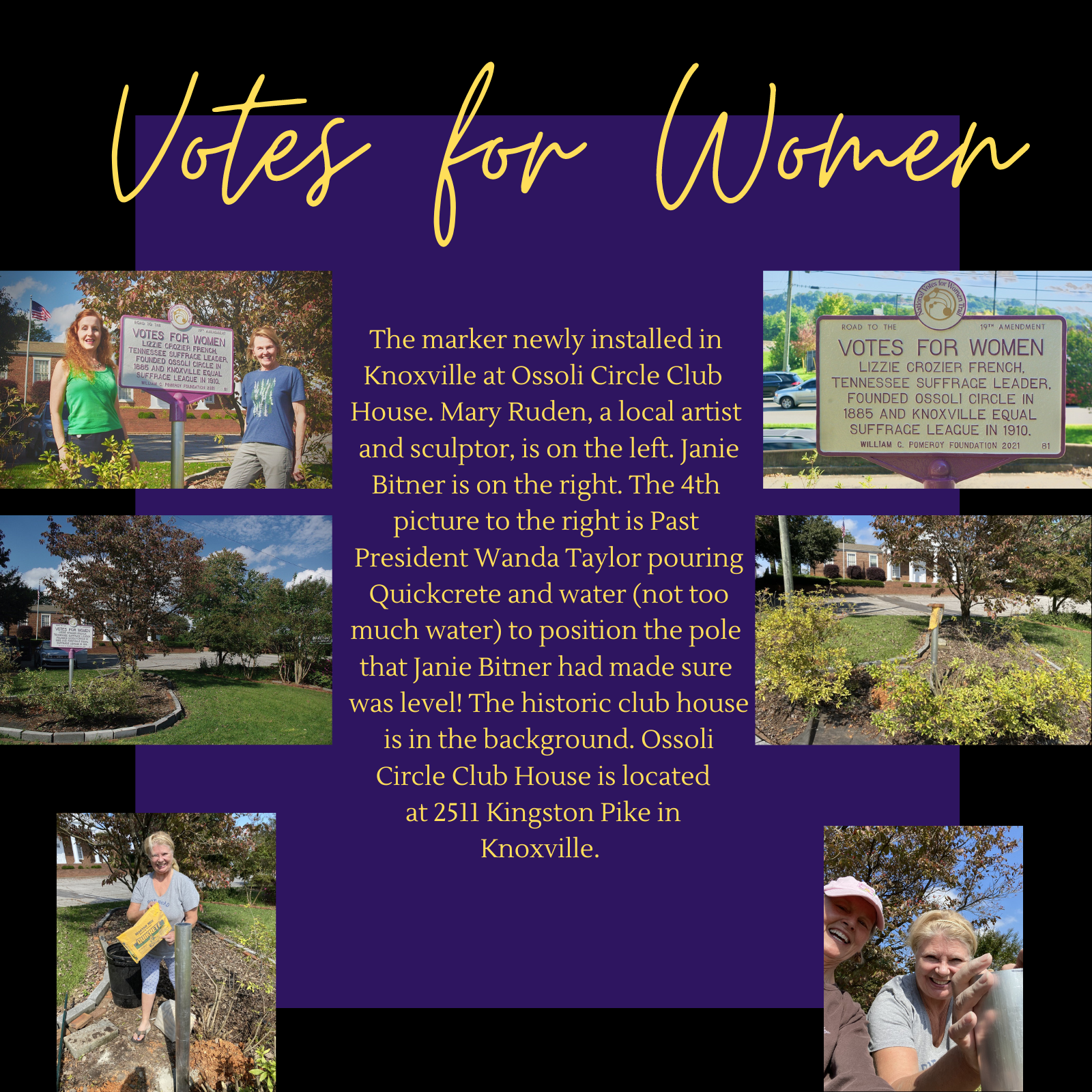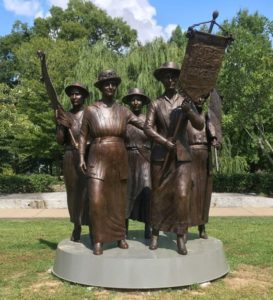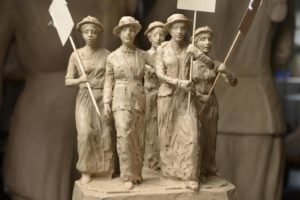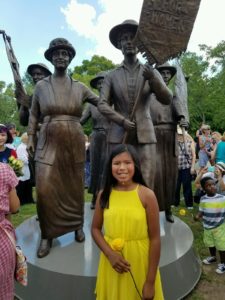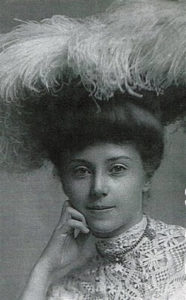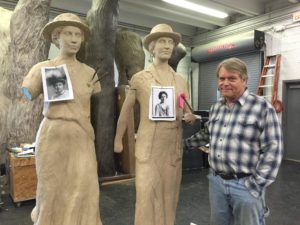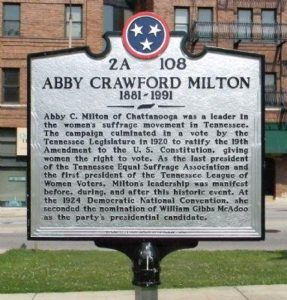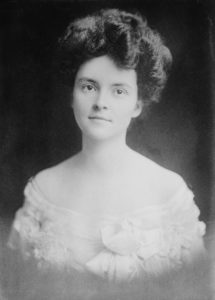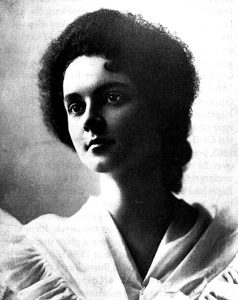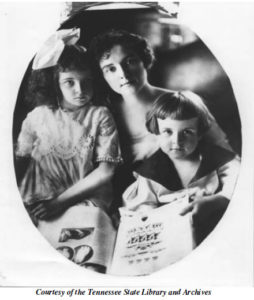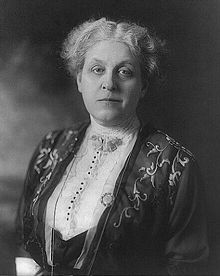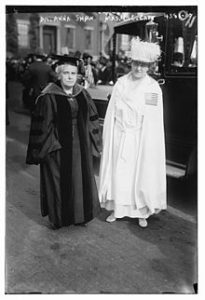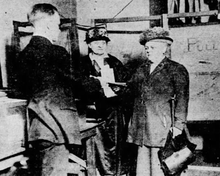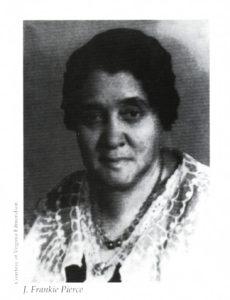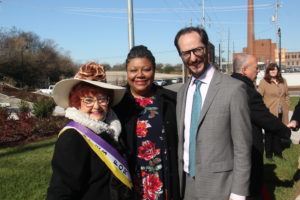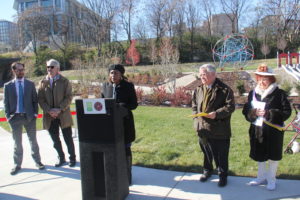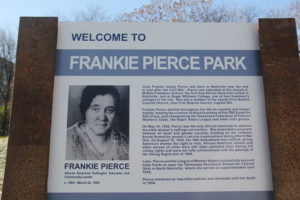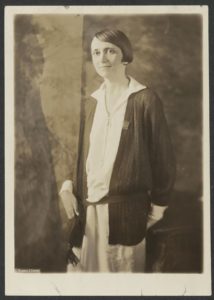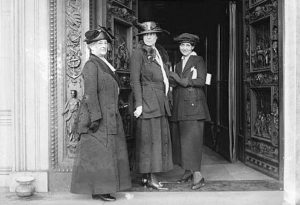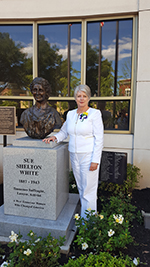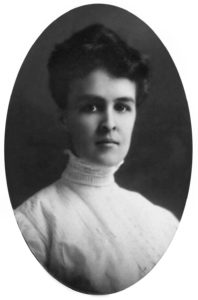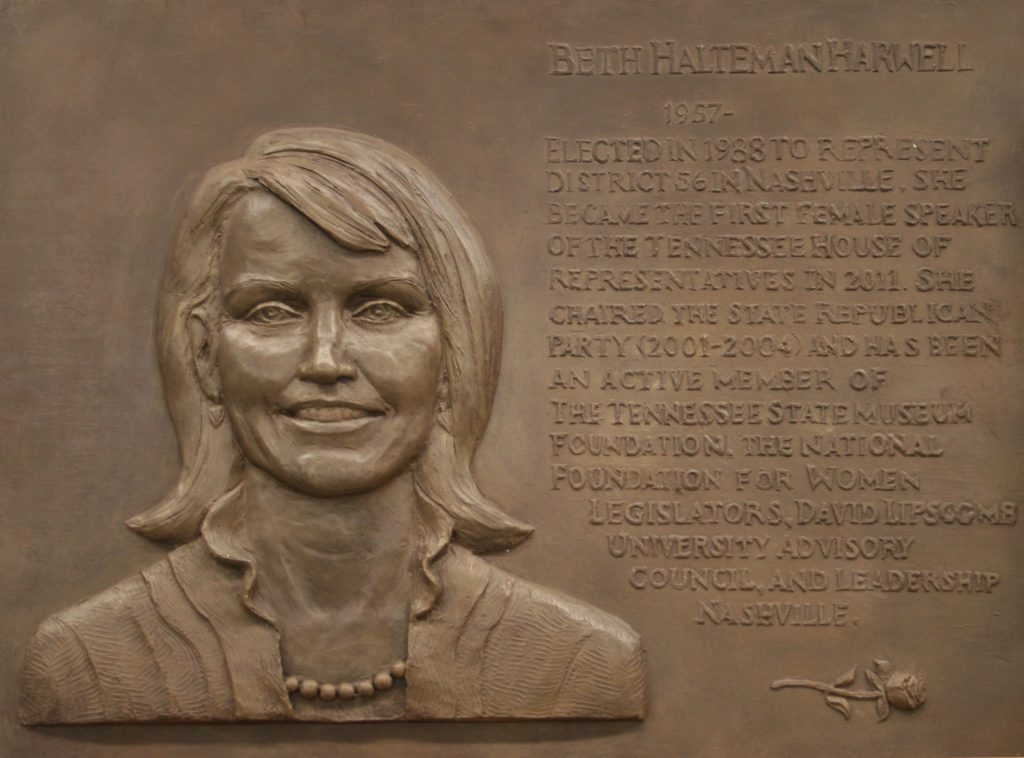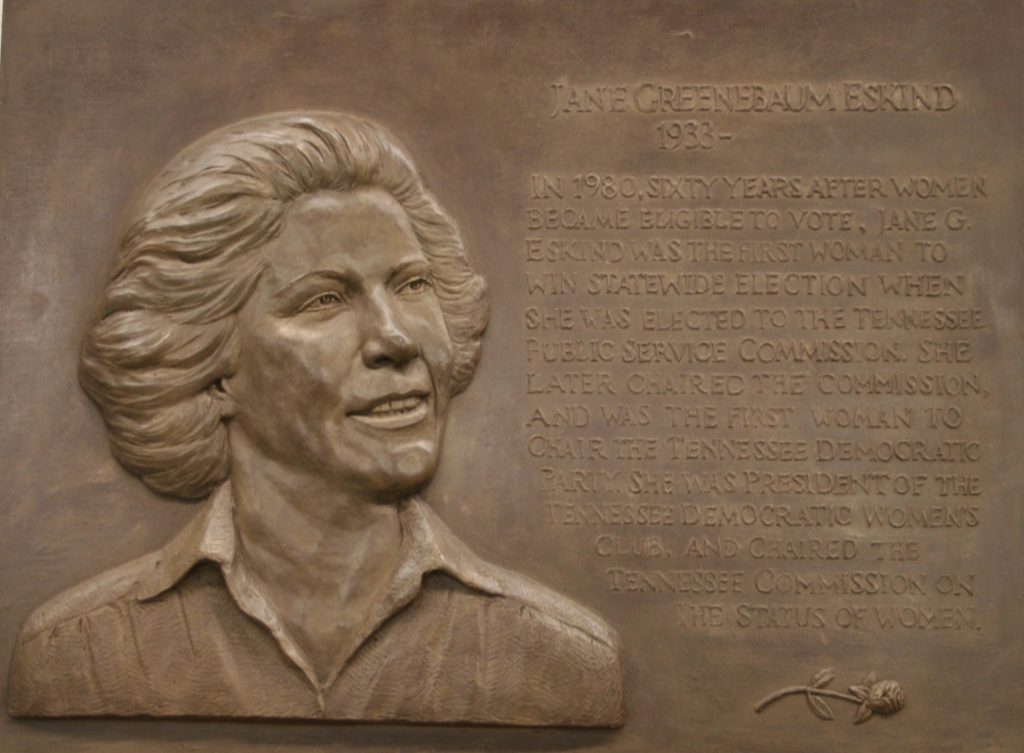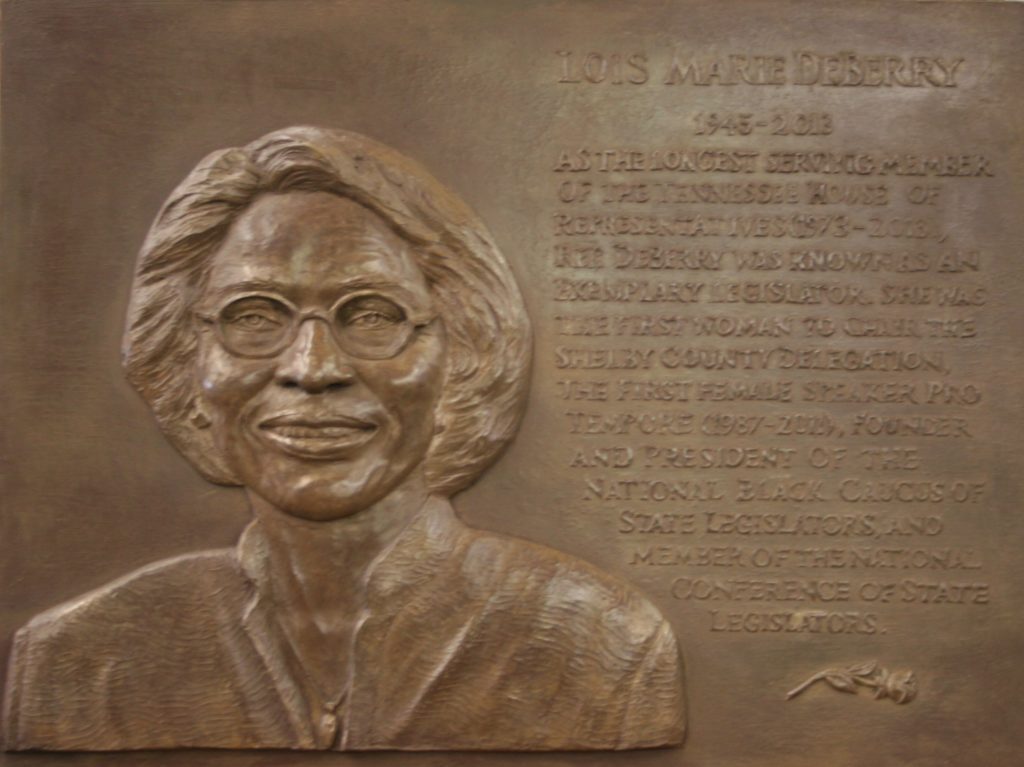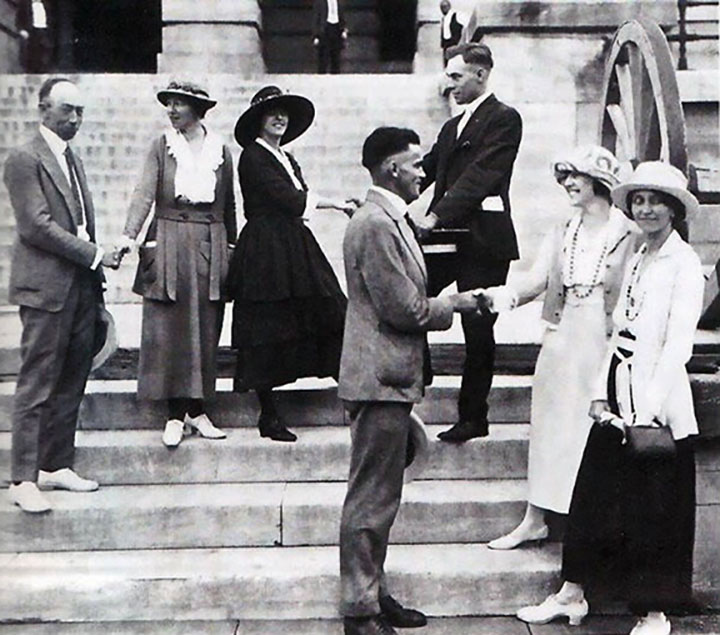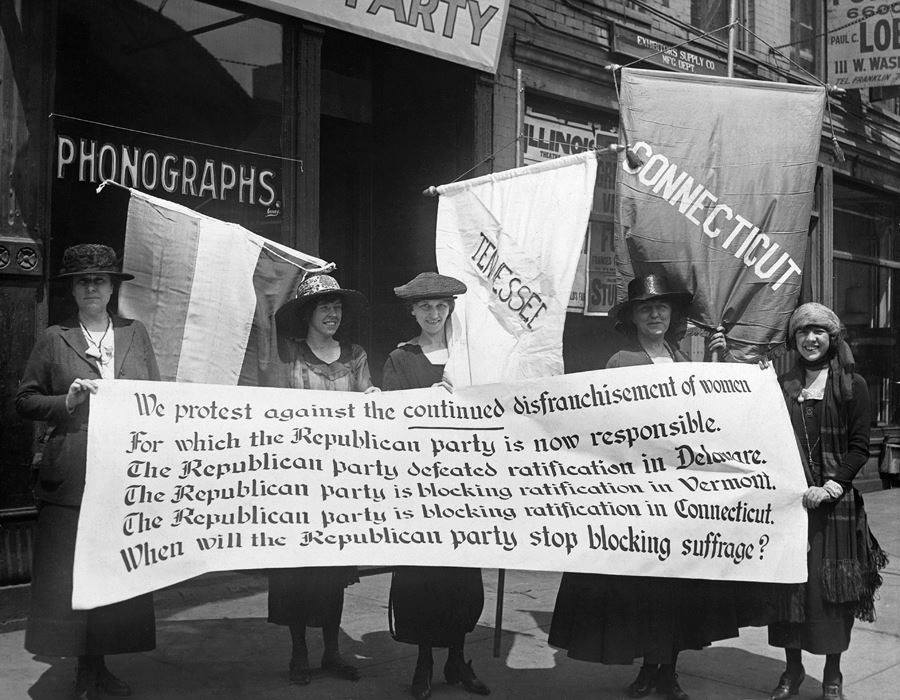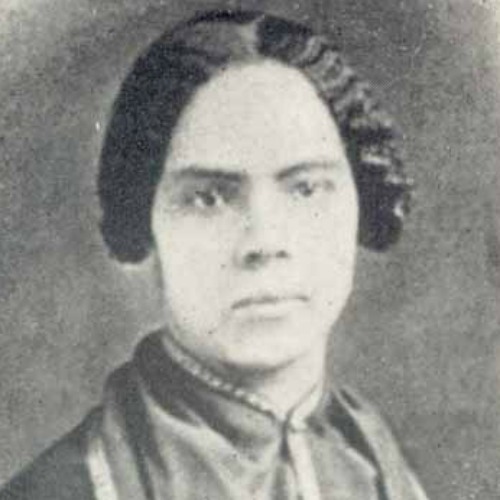Listen to great music from singer/songwriter Joyce Rouse about the woman suffrage movement:
Listen, buy, or stream from here: https://earthmama.hearnow.com/herstory
Feel free to leave reviews.
Tennessee Woman Suffrage Monument
Guest column: Suffrage monument to be unveiled on women’s equality day – commercialappeal.com
Women’s Suffrage: Tennessee and the Passage of the 19th Amendment – sos.tn.gov
Suffrage monument to be unveiled in Nashville – tennessean.com
Alan LeQuire’s Women Suffrage Monument unveiled in Nashville’s Centennial Park – tennessean.com
This Monument Celebrates Women (and Only 8% of Monuments Do … ) – styleblueprint.com
The True Story of Tennessee Suffragettes – nashvillelifestyles.com
Abby Crawford Milton (1881 – 1991)
Abby Crawford Milton – tennesseeencyclopedia.net
Abby Crawford Milton – wikipedia.org
Abby Crawford Milton – findagrave.com
bby Crawford Milton – infogalactic.com
Abby Crawford Milton (The Historical Marker Database) – www.hmdb.org
Photo Full Size – www.hmdb.org
(Marker Location) Abby Crawford Milton – 2A 108 – Chattanooga TN www.waymarking.com
Abby Crawford Milton papers [microform] : 1911-1930 – www.worldcat.org
Abby Crawford Milton – prabook.com
When Chattanooga Was Suffragette City – chattanoogapulse.com
Dedicated suffragist with Pleasant Hill Connection – crossville-chronicle.com
Grandma says – www.worldcat.org
TheChattanoogan.com – Role Of Abby Crawford Milton In Gaining Right For Women To Vote Is Celebrated
WRCBTC.com – HERstory: Abby Crawford Milton
101st Anniversary of the 19th Amendment-Honoring Abby Crawford Milton
Anne Dallas Dudley (1876 – 1955)
One of Tennessee’s most influential suffragists, Dudley founded the Nashville Equal Suffrage League, served as president of the Tennessee Equal Suffrage League in 1915, and as vice president of NAWSA in 1917. She was an indispensable campaigner for the final ratification effort in 1920.
Her beauty, charm, and eloquence made her the living refutation of the derogatory “she-male” label often attributed to suffragists by opponents. Her political acumen was widely recognized. She once demolished an anti-suffragist’s argument that “because only men bear arms, only men should vote.” Dudley pithily replied, “Yes, but women bear armies.”
Dudley and several other women met in the Tulane Hotel’s back parlor in September 1911 to found the Nashville Equal Suffrage League. The organization was dedicated to building local support while “quietly and earnestly avoiding militant methods.” The elegant Dudley served as the organization’s first president. During her presidency, the League organized giant “May Day” suffrage parades usually led by Dudley and her children.
Nashville was among several major cities across the country where parades were scheduled for the first Saturday in May. Dudley, daughter of Trevanion Dallas, a wealthy cotton mill owner, and great niece of George Dallas, who was James K. Polk’s vice president, was an organizer of the Nashville parade. It was the first suffrage parade in the South.
Dudley also helped bring the NAWSA convention to Nashville in November 1914, which was one of the largest conventions ever held there.
Dudley was elected to head the Tennessee Equal Suffrage Association in 1915 after serving in the local league for four years. In her three-year tenure as head of the Tennessee Equal Suffrage Association, she increased the number of leagues statewide from nine to sixty. Her political savvy was becoming known. She helped introduce a suffrage amendment to the state constitution and gained suffrage planks in the platforms of both parties.
When the state constitutional amendment failed, she pushed an alternative measure which would allow women to vote in presidential and municipal elections. This was a tactic that had worked in other states. The House passed the resolution on January 19, 1917. Twelve days later, the state Senate defeated it. She proclaimed, “We are not crybabies,” and reassembled her workers. Two years later in 1919, the resolution passed. She telegraphed this message to national headquarters: “We are voters in Tennessee. (signed) Anne Dallas Dudley”
Dudley contributed significantly on the national suffrage stage in 1917 to advancing legislation when she became Third Vice President of the NAWSA. Along with Catherine Talty Kenny of Nashville and Abby Crawford Milton of Chattanooga, she led the campaign to approve ratification when the time came for Tennessee’s pivotal vote in 1920.
At her most eloquent, Dudley transcended all questions of race and class. She declared: “We have a vision – a vision of a time when a woman’s home will be the whole wide world, her children all those whose feet are bare, and her sisters all those who need a helping hand: a vision of a new knighthood, of a new chivalry when men will fight not only for women but for the rights of women.”
Her legacy has been recognized in several ways:
• Featured on the Tennessee Woman’s Suffrage Memorial which was unveiled in Knoxville in 2006, along with Lizzie Crozier French of Knoxville and Elizabeth Avery Meriwether of Memphis
• Featured along with ten other prominent Tennesseans in The Pride of Tennessee, the official Tennessee State Bicentennial Portrait which hangs in the Tennessee State Capitol in Nashville
• Recognized with a historical marker in Nashville’s Centennial Park dedicated to her
• Inducted into the National Women’s Hall of Fame in 1995 in Seneca Falls, New York
• Featured with four other suffragists on the Tennessee Woman Suffrage Monument which was unveiled on August 26, 2016, in Nashville’s Centennial Park
• The city street was known as Capitol Boulevard beside The Hermitage Hotel and near the state capitol building has been approved by the Metropolitan Nashville Council to be re-named Anne Dallas Dudley Boulevard.
Tennessee High School receives statewide recognition for senior voter registration
wikipedia.org – Anne Dallas Dudley
findagrave.com/memorial – Anne Dudley
womenofthehall.org/inductee/anne-dallas-dudley
inthevintagekitchen.com – Anne Dallas Dudley
dictionnaire.sensagent.leparisien – Anne Dallas Dudley
hmdb.org/marker – Anne Dallas Dudley
Tennessean.com – Anne Dallas Dudley Led Suffrage Movement
Carrie Chapman Catt (1859 – 1947)
Carrie Chapman Catt – en.wikipedia.org
Carrie Chapman Catt – www.history.com
Carrie Chapman Catt – American feminist leader – britannica.com
Carrie Chapman Catt Biography – biography.com
Williamsonherald.com – Carrie (Lane) Chapman Catt (1859-1947)
Timeline of Catt’s Life
- 1859 – Born January 9 to Lucius and Maria (Clinton) Lane in Ripon, Wis.
- 1866 – Moves with family to Charles City, Iowa.
- 1877 – Enters Iowa Agricultural College (now Iowa State University) in Ames, Iowa.
- 1880 – Graduates with a Bachelor of Science degree in general science course for women as the only woman in her class.
- 1883 – Becomes Superintendent of Schools in Mason City, Iowa, one of the first women to hold such a position.
- 1885 – Marries Mason City newspaper editor and publisher Leo Chapman in February.
- 1886 – Remains in San Francisco, California, canvassing for ads and writing freelance articles, after husband Leo Chapman dies of typhoid fever there.
- 1887 – Moves back to Iowa and joins Iowa Woman Suffrage Association.
- 1890 – Marries engineer and Iowa State classmate George W. Catt in June. Delegate to National American Woman Suffrage Association national convention.
- 1900 – Succeeds Susan B. Anthony as president of the National American Woman Suffrage Association.
- 1904 – Establishes the International Woman Suffrage Alliance and serves as president. Resigns as president of the National American Woman Suffrage Association to take care of her ailing husband.
- 1905 – George Catt dies in October.
- 1911-12 – World tour promoting woman suffrage and international peace. Visits Norway, Sweden, South Africa (meets with Gandhi), Egypt, Ceylon, India, Hong Kong, the Philippines, and China.
- 1914 – New York City magazine editor and publisher Miriam Folline Leslie bequeaths Catt one-half of her estate (worth more than $1 million) “for the cause of woman suffrage.”
- 1915 – Returns to the United States and resumes leadership of the National American Woman Suffrage Association. Organizes Women’s Peace Party with Jane Addams.
- 1916 – Proposes “Winning Plan” to campaign for suffrage on both state and federal levels.
- 1919 – U.S. House of Representatives passes suffrage amendment on May 21. U.S. Senate passes suffrage amendment on June 4. Continues to work to ensure ratification of 19th Amendment by 36 of 48 state legislatures. Proposes creation of nonpartisan educational organization for women voters.
- 1920 – League of Women Voters founded by Catt on February 14. Tennessee becomes 36th state to ratify suffrage amendment on August 18. U.S. Secretary of State certifies ratification of 19th Amendment on August 26.
- 1921 – Becomes the first woman to deliver a commencement address at Iowa State.
- 1923 – Co-authors “Woman Suffrage and Politics: The Inner Story of the Suffrage Movement.” Retires as president of the International Woman Suffrage Alliance and made honorary chair.
- 1925 – Forms the Committee on the Cause and Cure of War and serves as its chair.
- 1926 – Featured on the cover of Time magazine.
- 1930 – Delivers commencement address at Iowa State. Receives Pictorial Review Award for her international disarmament work.
- 1932 – Resigns as chair of the Committee on the Cause and Cure of War and becomes honorary chair.
- 1941 – Receives the Chi Omega Award at the White House from longtime friend Eleanor Roosevelt.
- 1947 – Dies at her home in New Rochelle, N.Y., on March 9.
- 1975 – Becomes one of the first inductees into the Iowa Women’s Hall of Fame.
- 1982 – Inducted into the National Women’s Hall of Fame.
- 1992 – Named one of the 10 most important women of the century by the Iowa Centennial Memorial Foundation and presented with its Iowa Award for service of nationwide importance. Carrie Chapman Catt Center for Women and Politics established at Iowa State University.
- 1995 – Dedication of newly renovated Carrie Chapman Catt Hall, formerly Old Botany, at Iowa State University.
- 2013 – One of the first four women to be honored on the Iowa Women of Achievement Bridge in Des Moines, Iowa.
- 2016 – First appears in statuary on the Tennessee Woman Suffrage Monument in Nashville’s Centennial Park alongside four Tennessee suffragists
Source: https://cattcenter.iastate.edu/home/about-us/carrie-chapman-catt/
Frankie Pierce (1864 – 1954)
Founder of the City Federation of Colored Women’s Clubs in Nashville; a founder of the Tennessee Federation of Colored Women’s Clubs; and a founder of the Negro Women’s Reconstruction Service League. She organized protests against lack of restroom facilities for blacks in downtown Nashville and was an outspoken advocate of equal suffrage. At the invitation of Catherine Talty Kenny, Mrs. Pierce was a speaker on May 18, 1920, for the first meeting of the Tennessee League of Women Voters, held in the House chambers at the Capitol. “What will the negro [sic] woman do with the vote?” she asked. “We are going to make you proud of us and yourselves….We want a state vocational school and a child welfare department of the state, and more room in state schools .” Building upon the momentum of women’s empowerment after the ratification of the19th Amendment, she intensified her efforts for a state vocational school; the bill creating the Tennessee Vocational School for Colored Girls was passed by the General Assembly on April 7, 1921. Mrs. Pierce became its first superintendent, serving until 1939.
Tennessee Vocational School for Colored Girls – tennesseeencyclopedia.net
Wikipedia.org – Juno_Frankie_Pierce
Tennessee Encyclopedia.net – Juno-Frankie-Pierce
Documents.AlexanderStreet.com – Writing of Black Women Suffragists – Juno Frankie Pierce
FindAGrave.com – Juno-Frankie-Pierce
Britannica.com Biography – Franklin-Pierce
Facebook.com – TNSocietyDar – Juno Frankie (Seay) Pierce
WSMV.com – Murals in Capitol View Honor Women’s Suffrage and Frankie Pierce
Sue Shelton White (1887-1943)
One of Tennessee’s most effective suffragists, the Henderson native was one of the first women court reporters in the state in 1907. White joined the woman suffrage movement and helped organize the Jackson Equal Suffrage League in 1911. While working to increase support for suffrage in Tennessee, she served as recording secretary for the Tennessee Equal Suffrage Association beginning in 1913. She later came to believe that the policies and methods of the more activist National Woman’s Party (NWP) were more effective and changed her allegiance in 1918.
Upon moving to Washington, DC, White became Tennessee chair of the NWP in 1918 and edited the organization’s newspaper, The Suffragist. She achieved additional notoriety for participating in a suffrage demonstration in which the NWP burned President Woodrow Wilson in effigy. Arrested for picketing the White House in 1919, she served five days in the Old Work House, a condemned jail. After her release, White joined the “Prison Special,” a chartered railroad car that traveled around the country bringing the suffrage issue to the people. She was the only known Tennessee woman jailed for her suffrage work.
During the 1920 ratification campaign in Nashville, she headed the NWP campaign and coordinated their work with Carrie Chapman Catt’s NAWSA as both lobbied lawmakers. Known for being politically sagacious, “Miss Sue” coordinated her workers out of the Tulane Hotel. Catt’s group operated from the Hermitage Hotel.
In 1923, after the amendment was passed, White earned her law degree from Washington College of Law in Washington, DC, and worked for Senator Kenneth McKellar (D-TN). She later worked as an attorney for Franklin Roosevelt’s administration to help implement the Social Security Act. In the 1920s-30s, she held other important posts in Washington, DC, with the Democratic National Committee, the Woman’s Bureau, and the Social Security Board. After a long bout with cancer, White died on May 6, 1943.
Suffragist Sue Shelton White honored in Jackson – jacksonsun.com
Sue Shelton White: Lady Warrior – muse.jhu.edu
Women vote because ‘Miss Sue’ fought – jacksonsun.com
wanderwomenproject.com – Sue Shelton White Statue
Local West Tennessean Honored Pioneer Womens Suffrage
Marion Scudder Griffin (1879-1957)
Marion Scudder Griffin was the first female attorney in Tennessee, as well as the first woman to serve in the Tennessee House. Upon moving to Memphis, she worked in Judge Thomas M. Scruggs’ office as a stenographer. She also began studying to obtain a law license. On February 15, 1900, she was certified by Chancellor Dehaven and Circuit Court Judge Estes for admission to the bar. Despite this, the Tennessee Supreme Court denied Griffin a legal license on the basis of her sex twice, in 1900 and 1901. Undeterred, she began to study at the University of Michigan’s Law School, earning a Bachelor of Laws degree by 1906. She was one of two women in her graduating class.
Returning to Tennessee, she lobbied the state legislature to pass a law that would grant women the right to practice law. Though she was initially derided, she convinced the legislature and a bill was passed on February 13, 1907, and signed by Governor Patterson two days later. On July 1, 1907, Griffin was licensed by the Tennessee Supreme Court and sworn in as a member of the local bar. She went on to practice law in Memphis from 1907-1949.
In 1923, Griffin became the first woman ever elected to the Tennessee state House. As was noted in a commercial Appeal article of August 3, 1950, Griffin had the support of public figures like C.P.J. Mooney, the newspaper’s editor, during her campaign. She served a single term, headed the House Social Welfare Committee, and promoted various legislation affecting women and children.
Marion Scudder Griffin – www.findagrave.com
Marion Scudder Griffin Collection – memphislibrary.contentdm.oclc.org
General Information
Pete Seeger, Anita Pollitzer And The “War Of The Roses” – hudsonvalleyone.com
19 Facts About the 19th Amendment – mentalfloss.com
Woman Suffrage Movement – tennesseeencyclopedia.net
The Radical Roots of Mother’s Day – thedailybeast.com
The 3 Tennessee Trailblazers
These 3 Tennessee Trailblazers are featured around the Tennessee Woman Suffrage Monument in Nashville’s Centennial Park
Jane Greenebaum Eskind (1933 – 2016)
Jane G. Eskind was the first woman to win a statewide election in Tennessee. Her victory in 1980 came 60 years after the 19th Amendment’s ratification.
Raised and educated in Louisville, KY, she attended Brandeis University, married Richard Eskind, completed her undergraduate degree at the University of Louisville, and moved to Nashville in 1956. The Eskind’s had a daughter, Ellen, and a son, Billy. She began an activist career first as a lobbyist for the Tennessee League of Women Voters from 1964-69. She became active in Democratic Party politics as a campaign worker, Democratic Women’s Club member and then representing Tennessee on the Democratic National Platform Committee. In 1974, she won election to the Democratic State Executive Committee.
She first ran for office in 1978 winning the Democratic primary to face U.S. Sen. Howard Baker, Jr. She was the first woman to either party’s nomination for statewide office. She lost to Baker, but won a seat on the former Public Service Commission and later served as chair. She ran for governor in 1986 placing second to Ned Ray McWherter for whom she campaigned vigorously in his successful race to become governor. In 1987, she made an unsuccessful bid for Congress in a special election.
In 1994, she became the first woman to chair the Tennessee Democratic Party having served earlier as president of the Democratic Women’s Club. Eskind also served in numerous leadership positions with various Democratic Party committees including the National Finance Council for President Bill Clinton. She was active with the Anti-Defamation League, the International Women’s Forum, and Women Executives in State Government. She chaired the Tennessee Commission on the Status of Women from 1978-1980. She was a trustee for the Vice-President’s Residence Foundation and served on the Brandeis University Board of Trust.
Numerous other organizations benefited from her service and advice. Women running for office always sought Eskind’s counsel. She was generous, thoughtful, accessible, insightful, and always supportive to those who sought her out.
Jane Greenebaum Eskind – tennesseeencyclopedia.net
Jane G. Eskind Obituary – www.legacy.com
Resolution to Honor Jane Eskind – publications.tnsosfiles.com
Jane Eskind over the years (Slideshow) – www.tennessean.com
Jane Eskind left legacy to be carried on – courier-journal.com
House Joint Bill to honor the memory of Jane Eskind – capitol.tn.gov
Lois Marie DeBerry (1945 – 2013)
Lois M. DeBerry shattered the political glass ceiling when she was elected the first woman speaker pro tempore of the Tennessee House of Representatives in 1987. She served in that capacity until 2011. A former educator, she championed programs in health, education, and the criminal justice system, especially those affecting women and children. She was the first black woman elected to the House from Memphis (and second in the state), and she was the longest-serving member of the House at the time of her death in July 2013.
Rep. DeBerry, who was elected in 1972 and began serving in the legislature in January 1973, was the first female to chair the Shelby County legislative delegation. A founder of the Tennessee Legislative Black Caucus, she served as president/president emeritus of the National Black Caucus of State Legislators. She also was a founder of the National Organization of Black Elected Legislative Women, which named a scholarship in her honor. She achieved national and international renown for her leadership among members of the National Conference of State Legislators, the National Black Caucus of Local Elected Officials, Women in Government, the State Legislative Leaders Foundation, the Southern Legislative Conference, and the National Organization of Black Law Enforcement Executives.
The Lois M. DeBerry Special Needs Facility, a maximum-security prison in Nashville operated by the state Department of Correction, opened in 1992. It houses prisoners with complex and multiple medical problems.
The longtime Delta Sigma Theta Sorority member served as an inspiration to women as a strong voice in the male-dominated world of politics. She was also active in the Memphis Chapter of The Links and the NAACP.
Remembering Lois DeBerry (Video) – wreg.com
www.legacy.com – Lois Deberry-Obituary
Beth Halteman Harwell (1957 – Present)
Beth Halteman Harwell – tennesseeencyclopedia.net
Your Source for Tennessee History – tennesseehistory.org
https://en.wikipedia.org/wiki/Beth_Harwell
Suffrage is at last the law of the land
April 23, 1920 (right photo): Prominent Members of the National Woman’s Party entering the Capitol to attend the Supreme Court Hearing on the Ohio Suffrage Referendum Case. Ohio has been counted in the ratification column but if the Court allows a referendum on Suffrage it will be necessary for the “Sufs” to obtain ratification in another state if women are to vote for the next President. Left to Right Mrs Richard Wainright [i.e. Wainwright], wife of Adml Wainright [i.e. Wainwright] and Member of the Ex Com. National Woman’s Party. Mrs Abby Scott Baker, Political Chairman Nat. Woman’s Party. and Miss Sue White, Chairman Research Div. Nat Woman’s Party.
Pictures Source: Library of Congress Prints and Photographs Division
Mary Ann Shadd Cary (1823-1893)
Additional Resource Links:
MCHSociety Organization: Historical Events on Women’s Suffrage
NPR.ORG – How Racism Tainted Womens Suffrage
Tennessee Encyclopedia.net – Woman Suffrage Movement
wanderwomenproject.com – Burn Memorial
National Votes for Women Trail
Johnson City “Passing the Torch”: Honoring Women’s Suffrage 1920-2020
Johnson City – QR Content for “Passing the Torch” Mural – The Coalition Story
